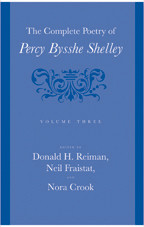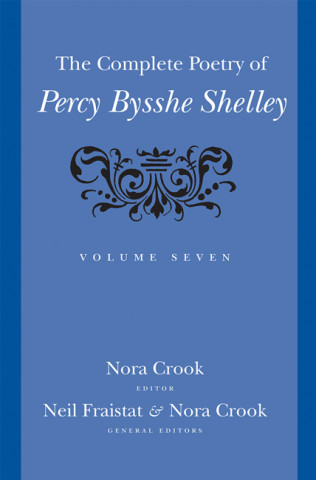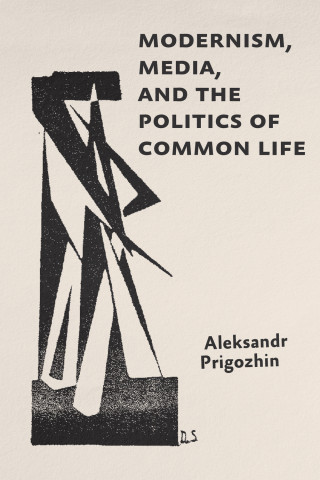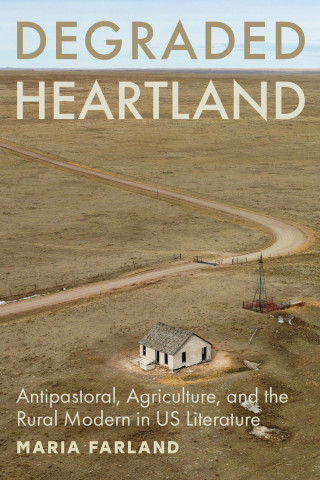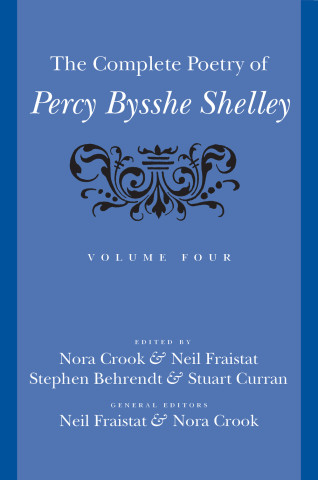
Reviews
The detail and precision of the textual editing here are exemplary: the publication history of the poems, along with the tangled manuscript evidence behind and alongside the original volumes, is dealt with clearly and (when need be) decisively, to produce a hugely authoritative—as well as huge—edition.
Rigorously, enthusiastically, and innovatively edited, this volume has brought excitement and zest to my Shelley-reading life.
With volume seven raising the bar once again, this series is the gold standard for Shelley scholarship. Its expert and illuminating readings are peerless.
Exciting revelations, new connections, and editorial discoveries abound in volume seven, which is testament to the brilliance of one of our greatest scholars and editors of the Shelleys, Nora Crook.
Like the previous [The Complete Poetry of Percy Bysshe Shelley] editions, Crook's latest contribution is both indispensable and delightful, a resource to be prized not only for its careful and authoritative presentation of Shelley's poetry but also for the incisive commentary and contextualization Crook provides throughout....the twin hearts of this edition are, of course, "Texts" and "Commentaries," the former providing the now-definitive texts of each work and the latter a collection of acute analyses that represents the lion's share of this volume's thousand pages. In a slight but useful departure from the earlier volumes in this series, each commentary opens with a headnote that provides item-specific notes as well as information about the text's genesis and transmission and critical history.
CPPBS 7 is set to become a model for editing modern poetry manuscripts. It strikes a difficult balance between philological rigor and scholarly comprehensiveness on the one hand and readability and usability at different levels of expertise on the other. Textual critics and students of Shelley's poetry will find it equally indispensable, but it will also serve as an important reference work for Mary Shelley scholars.
This outstanding installment of an epoch-making edition of Shelley's verse will transform the opportunities afforded to emerging Shelley scholars.
The detail and precision of the textual editing here are exemplary: the publication history of the poems, along with the tangled manuscript evidence behind and alongside the original volumes, is dealt with clearly and (when need be) decisively, to produce a hugely authoritative—as well as huge—edition.
This latest installment of The Complete Poetry is nothing less than a landmark in Shelley studies: comprehensive and reliable, necessary and illuminating.
This is a critical volume of Shelley's works for the twenty-first century—in short, a scholarly masterpiece. No academic library should be without it.
[I]t is tremendously exciting to have access to a resource that provides such an intimate look into the poet's world and his creative process.
An indispensable reference work for all who study Shelley.
What makes this volume so exceptional (like its predecessors) is not only the state-of-the-art editing, but also the knowledgeable commentaries that give information on the poems' composition, possible sources and influences, publication, and most welcome, their reception history.... This gigantic editorial project cannot be praised highly enough.
Will almost certainly be the standard in Shelley scholarship.
A monumental edition—the Shelley edition for our time.
A scholarly delight.
In gathering together all his earliest pieces, including some that have been unavailable in standard editions of the collected poetry, Donald Reiman and Neil Fraistat's meticulously edited volume brings out the aims Shelley had for his verse, and the effects he sought, which remained surprisingly uniform.
If ever an edition deserved the chimerical epithet 'definitive' this is it. A more comprehensive collation of relevant materials, or a more sensitive, sensible, and reader-friendly presentation of evidence, is inconceivable. All Shelleyans owe Reiman and Fraistat a debt of gratitude. The edition this volume inaugurates will be an essential acquisition for academic libraries and should become the standard scholarly reference for all citations of Shelley's poems.
This edition will undoubtedly be indispensable for the serious study of Shelley's poetry.
These youthful poems prove that Shelley's enthusiasm for political solutions to moral problems was neither intellectual fakery nor aristocratic affection.
Donald Reiman and Neil Fraistat bring to their new edition an unrivaled knowledge of the textual evidence and a superb grasp of the important historical and critical issues. Their presentation of and commentary on the poetry Shelley produced up through his elopement with Mary Wollstonecraft Godwin in July 1814 is clarifying and revealing in itself and encourages the highest possible expectations for the volumes to follow. Their editorial principles, centered around the objective of offering critical redactions of single versions of all the poems arranged chronologically in the order in which Shelley released these versions to a particular public, are scrupulously conceived and meticulously applied. Scholars, students, and general readers of Shelley's poetry have reason to celebrate.
Quite possibly the most significant publication among this year's Romantic studies, The Complete Poetry of Percy Bysshe Shelley, Volume Seven, edited by Nora Crook, is a magisterial scholarly edition of Shelley's posthumously published poems, including "The Triumph of Life" and many other fragments that Mary Shelley first edited, including some of his most beloved shorter lyrics. Part of the ongoing editorial project now directed by Crook and Neil Fraistat, Volume Seven arrives as a stunning and indispensable book, modeling both textual stewardship and critical acumen.
Exciting revelations, new connections, and editorial discoveries abound in volume seven, which is testament to the brilliance of one of our greatest scholars and editors of the Shelleys, Nora Crook.
[T]his volume is a triumph, it is breathtaking, it is monumental, it is a summa.
To call this edition magisterial is to fall back on too lax a term of praise: it is rather a monument of precise, assured erudition in total command of the poems and almost two centuries of commentary on them, an awesome achievement that as it unfolds will replace all previous texts of Shelley's poetry as well as the whole of their contexts. I cannot imagine it being done by anyone else—or, for that matter, better.
The Complete Poetry of Percy Bysshe Shelley is a much needed work and Reiman and Fraistat are the best possible people to have done it. The research, knowledge, experience, and general thoughtfulness that have gone into the project are truly impressive. It will be a landmark event of Shelley scholarship.

